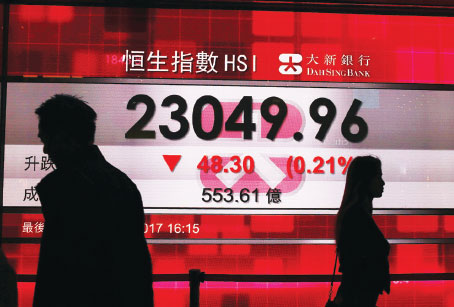HK feels Trump effect as it braces for Fed's early-bird rate hikes
Updated: 2017-01-20 07:51
(HK Edition)
|
|||||||||
Hong Kong stocks retreated Thursday on investors' concerns about the US Federal Reserve's increasingly proactive stand on raising interest rates to nip inflation in the bud.
Fed Chairwoman Janet Yellen was reported to have said that it "makes sense" to gradually increase interest rates so as to minimize the risk of a "nasty surprise down the road - either too much inflation, financial instability, or both".
Her statement was seen to contradict earlier market presumptions that the Fed would take reactive, rather than preemptive, action on changing circumstances brought about President-elect Donald Trump's professed expansive economic policy to stimulate growth. Trump's inauguration will take place on Saturday morning, Hong Kong time.
Stock analysts worry that an overly aggressive Fed interest rate policy could short-circuit the market rally which has been fueled by expectations of tax cuts, increased public sector expenditure, deregulation and, yes, demand-driven inflation.
Expectation of a faster-than-expected pace in interest-rate hikes in 2017 hit property stocks in Hong Kong. Yellen's talk came at a time when the major developers were keen on unloading their large inventories of newly completed apartments. Concern about rising borrowing cost could discourage many prospective home buyers from taking the plunge.
To be sure, sluggish sales aren't going to pose much of a threat to the financial structures of the cash-rich developers. But over time, the build-up of unsold apartments could result in a supply glut that could seriously depress developers' earnings in 2017 and beyond.
Meanwhile, the major banks continued to do well. Bucking the market trend, HSBC and Bank of China (Hong Kong) made gains. The local banks that derive a large portion of their earnings from mortgage financing, including Hang Seng and BEA, didn't do so well, as expected.
Some stock analysts maintained that concern over interest rates isn't going to have a long-lasting effect on the market, which has already discounted the possibility of faster and larger rate hikes in 2017. Nobody really expects the Fed would remove the punch bowl before the market gets overly rowdy.
|
Pedestrians walk past an electronic board showing the Hang Seng Index in Central. The Hong Kong benchmark index closed down 48 points at 23,049 on Thursday, after the US Federal Reserve indicated more interest rate increases would be coming this year. Roy Liu / China Daily |
(HK Edition 01/20/2017 page9)
